Each country has its own traditional cuisine, which

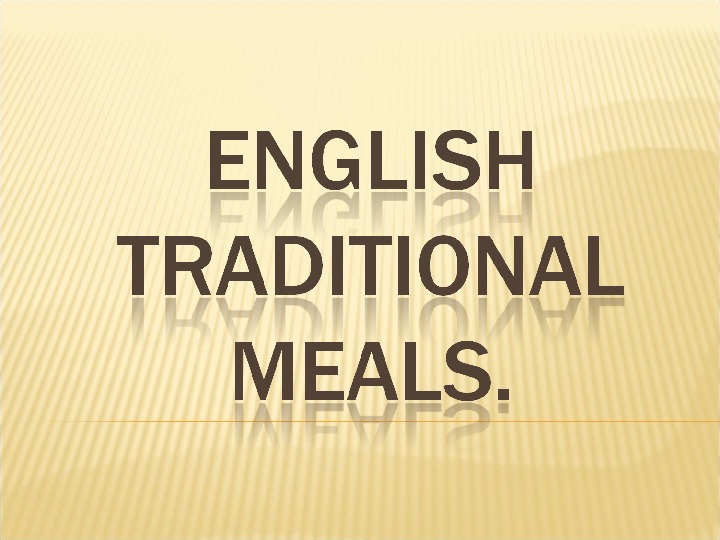
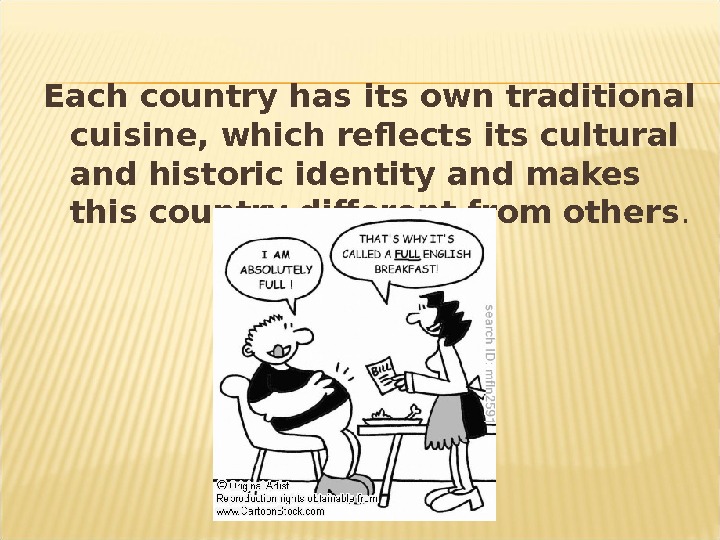
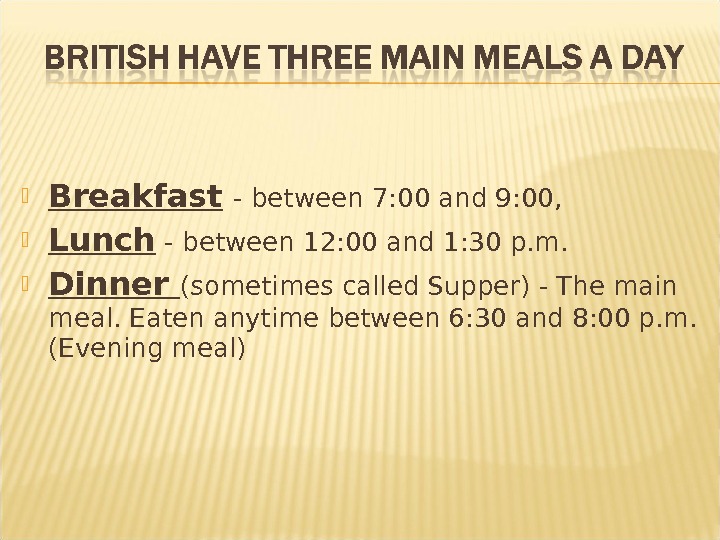

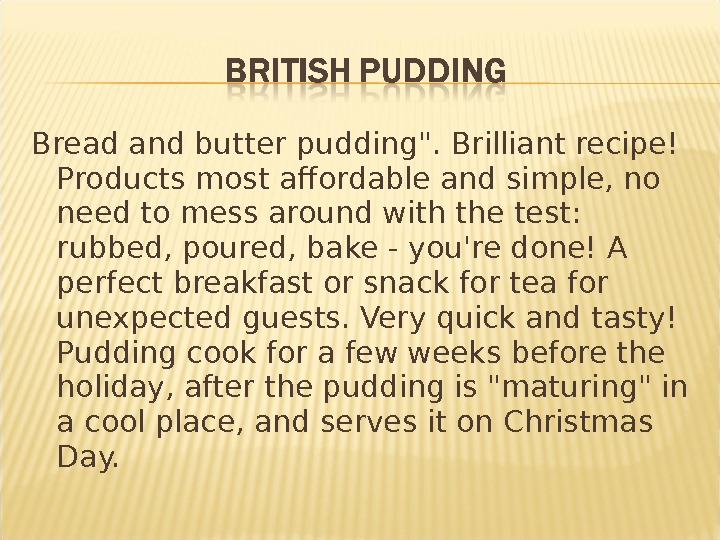
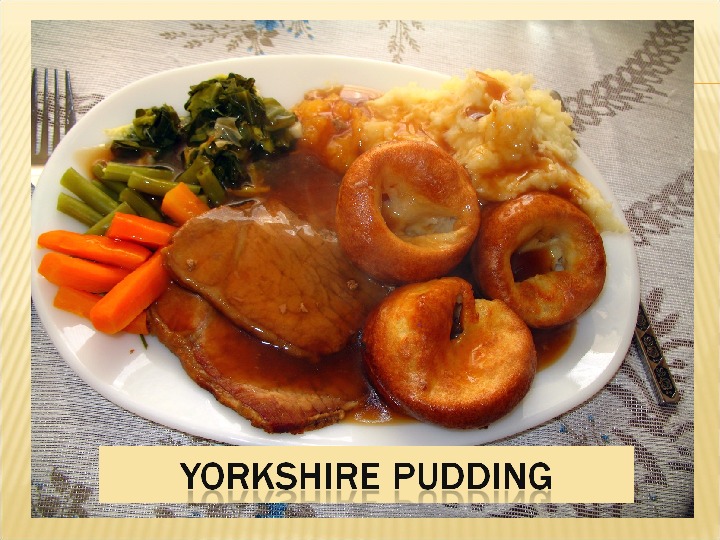

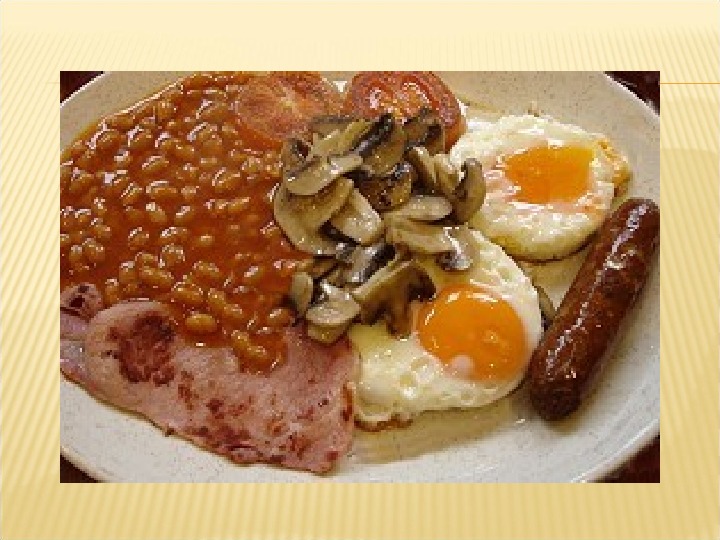

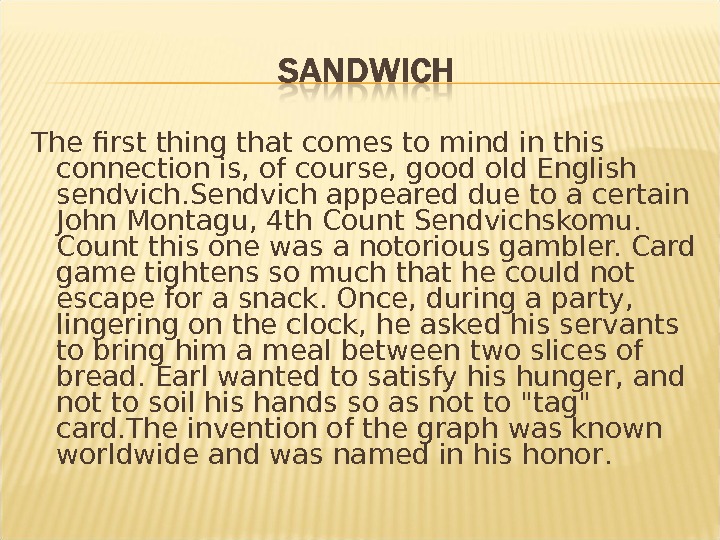
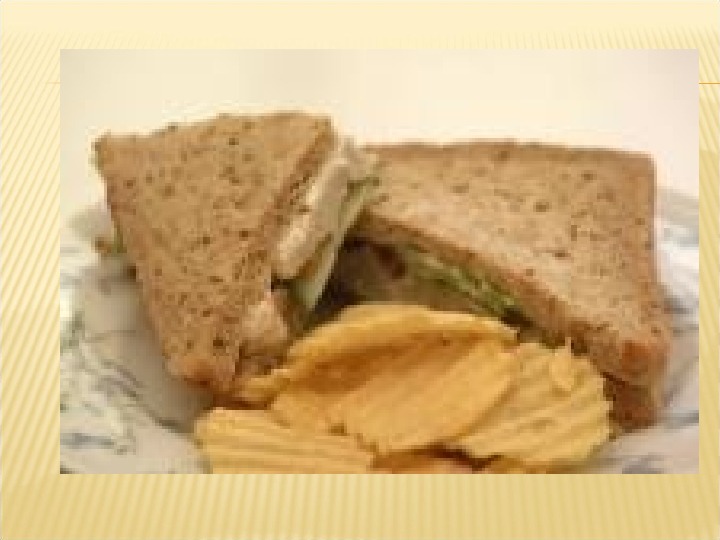


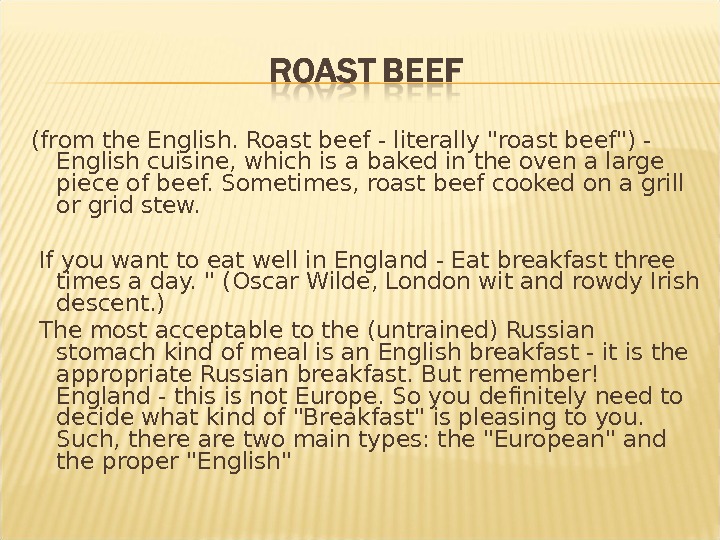
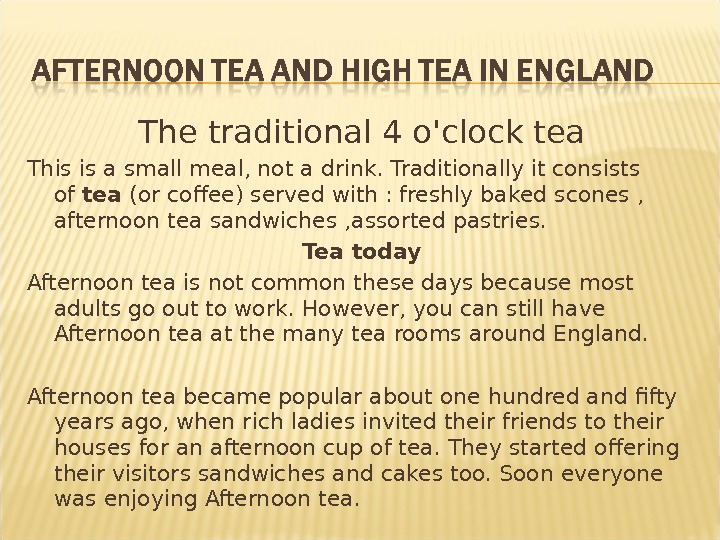
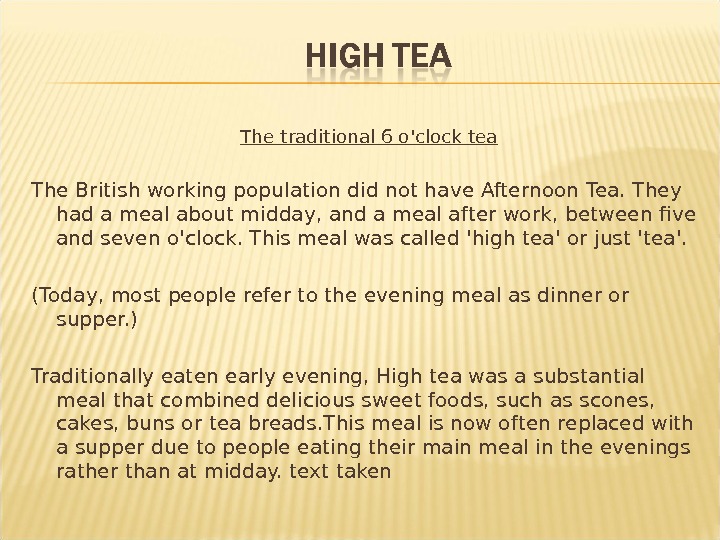
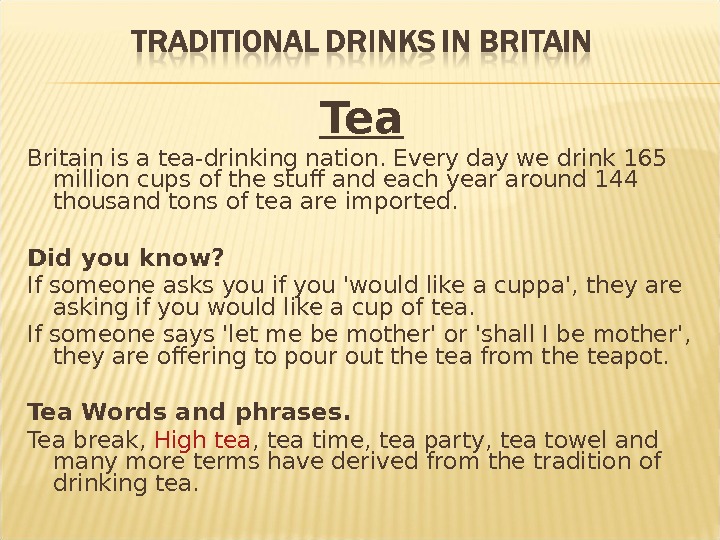
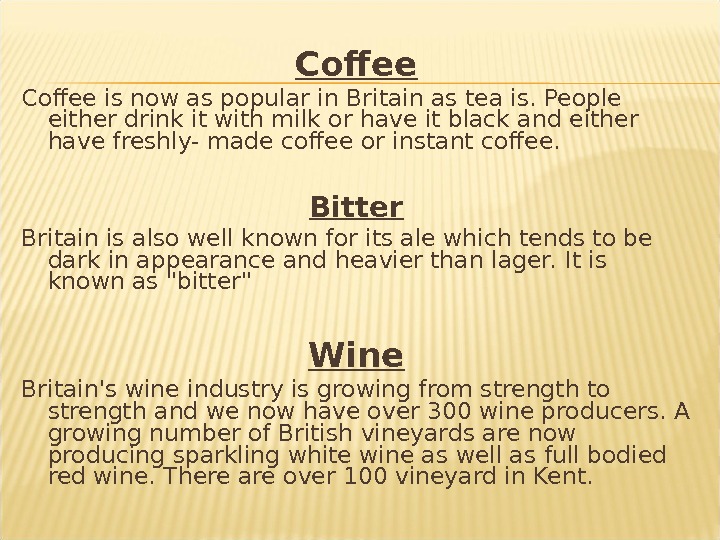
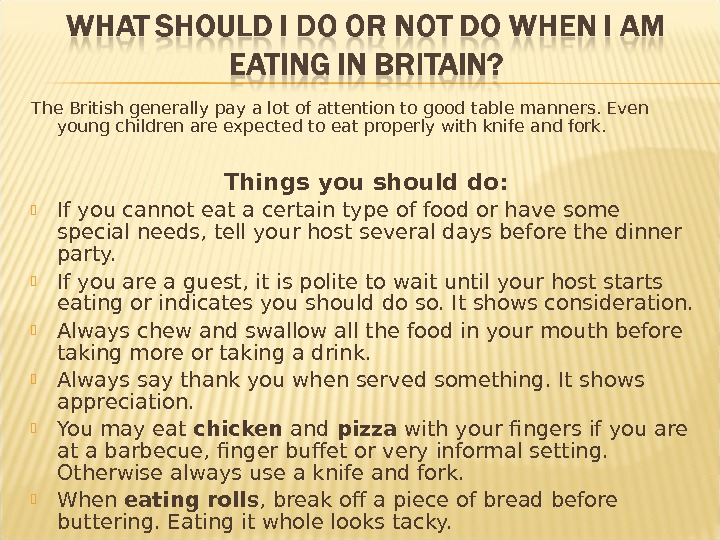
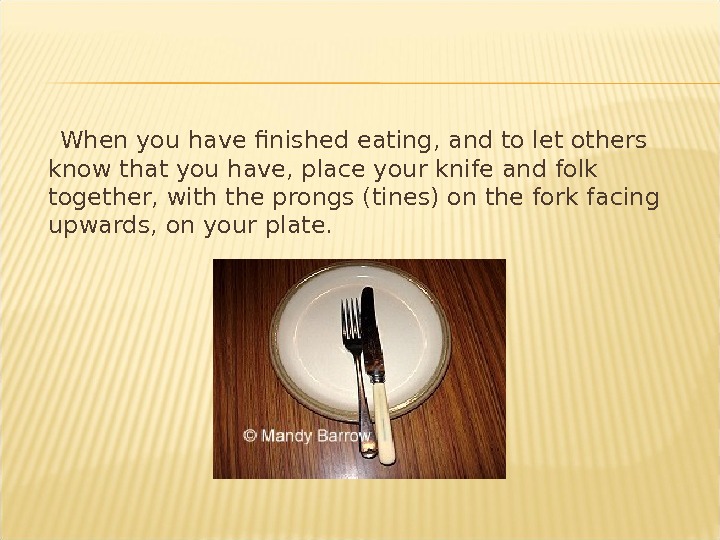
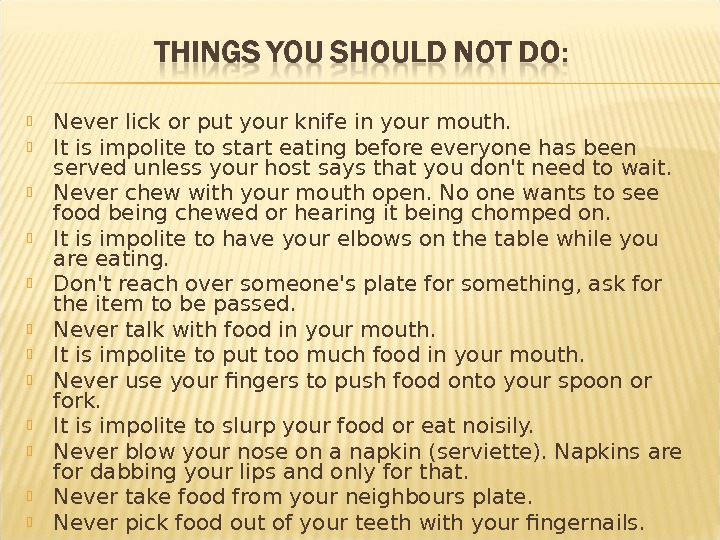

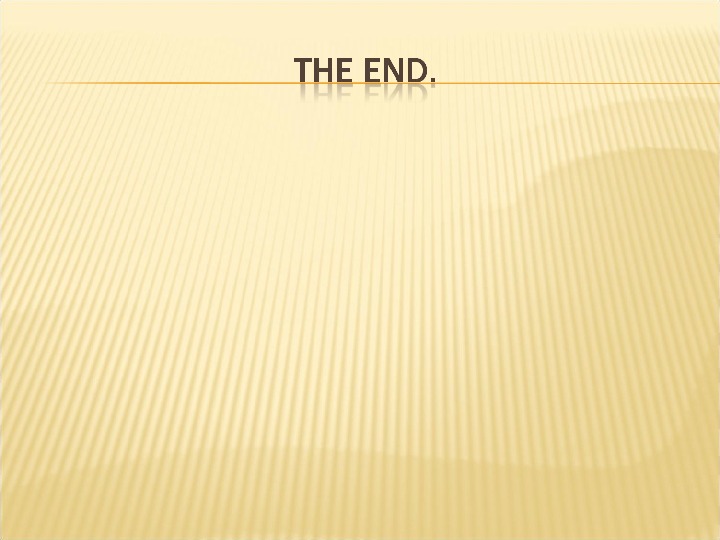
english_traditional_meals2.ppt
- Размер: 3.7 Mегабайта
- Количество слайдов: 23
Описание презентации Each country has its own traditional cuisine, which по слайдам

 Each country has its own traditional cuisine, which reflects its cultural and historic identity and makes this country different from others.
Each country has its own traditional cuisine, which reflects its cultural and historic identity and makes this country different from others.
 Breakfast — between 7: 00 and 9: 00, Lunch — between 12: 00 and 1: 30 p. m. Dinner (sometimes called Supper) — The main meal. Eaten anytime between 6: 30 and 8: 00 p. m. (Evening meal)
Breakfast — between 7: 00 and 9: 00, Lunch — between 12: 00 and 1: 30 p. m. Dinner (sometimes called Supper) — The main meal. Eaten anytime between 6: 30 and 8: 00 p. m. (Evening meal)
 Breakfast — between 7: 00 and 9: 00, Dinner (The main meal) — between 12: 00 and 1: 30 p. m. Tea — anywhere from 5: 30 at night to 6: 30 p. m. On Sundays the main meal of the day is often eaten at midday instead of in the evening. This meal usually is a Roast Dinner consisting of a roast meat, yorkshire pudding and two or three kinds of vegetables.
Breakfast — between 7: 00 and 9: 00, Dinner (The main meal) — between 12: 00 and 1: 30 p. m. Tea — anywhere from 5: 30 at night to 6: 30 p. m. On Sundays the main meal of the day is often eaten at midday instead of in the evening. This meal usually is a Roast Dinner consisting of a roast meat, yorkshire pudding and two or three kinds of vegetables.
 Bread and butter pudding». Brilliant recipe! Products most affordable and simple, no need to mess around with the test: rubbed, poured, bake — you’re done! A perfect breakfast or snack for tea for unexpected guests. Very quick and tasty! Pudding cook for a few weeks before the holiday, after the pudding is «maturing» in a cool place, and serves it on Christmas Day.
Bread and butter pudding». Brilliant recipe! Products most affordable and simple, no need to mess around with the test: rubbed, poured, bake — you’re done! A perfect breakfast or snack for tea for unexpected guests. Very quick and tasty! Pudding cook for a few weeks before the holiday, after the pudding is «maturing» in a cool place, and serves it on Christmas Day.

 The traditional English breakfast consists of eggs, bacon, sausages, fried bread, baked beans and mushrooms. Even though not many people will eat this for breakfast today, it is always served in hotels and guest houses around Britain. The traditional English breakfast is called the ‘Full English’ and sometimes referred to as ‘The Full English Fry-up’.
The traditional English breakfast consists of eggs, bacon, sausages, fried bread, baked beans and mushrooms. Even though not many people will eat this for breakfast today, it is always served in hotels and guest houses around Britain. The traditional English breakfast is called the ‘Full English’ and sometimes referred to as ‘The Full English Fry-up’.

 Many children at school and adults at work will have a ‘packed lunch’. This typically consists of a sandwich, a packet of crisps, a piece of fruit and a drink. The ‘packed lunch’ is kept in a plastic container. Sandwiches are also known as a ‘butty’ or ‘sarnie’ in some parts of the UK.
Many children at school and adults at work will have a ‘packed lunch’. This typically consists of a sandwich, a packet of crisps, a piece of fruit and a drink. The ‘packed lunch’ is kept in a plastic container. Sandwiches are also known as a ‘butty’ or ‘sarnie’ in some parts of the UK.
 The first thing that comes to mind in this connection is, of course, good old English sendvich. Sendvich appeared due to a certain John Montagu, 4 th Count Sendvichskomu. Count this one was a notorious gambler. Card game tightens so much that he could not escape for a snack. Once, during a party, lingering on the clock, he asked his servants to bring him a meal between two slices of bread. Earl wanted to satisfy his hunger, and not to soil his hands so as not to «tag» card. The invention of the graph was known worldwide and was named in his honor.
The first thing that comes to mind in this connection is, of course, good old English sendvich. Sendvich appeared due to a certain John Montagu, 4 th Count Sendvichskomu. Count this one was a notorious gambler. Card game tightens so much that he could not escape for a snack. Once, during a party, lingering on the clock, he asked his servants to bring him a meal between two slices of bread. Earl wanted to satisfy his hunger, and not to soil his hands so as not to «tag» card. The invention of the graph was known worldwide and was named in his honor.

 The evening meal is usually called ‘tea’, ‘dinner’ or ‘supper’. A typical British meal for dinner is » meat and two veg». They put hot brown gravy, (traditionally made from the juices of the roast meat, but more often today from a packet!) on the meat and usually the vegetables. One of the vegetables is almost always potatoes.
The evening meal is usually called ‘tea’, ‘dinner’ or ‘supper’. A typical British meal for dinner is » meat and two veg». They put hot brown gravy, (traditionally made from the juices of the roast meat, but more often today from a packet!) on the meat and usually the vegetables. One of the vegetables is almost always potatoes.
 Sunday lunch time is a typical time to eat the traditional Sunday Roast. Traditionally it consists of roast meat, (cooked in the oven for about two hours), two different kinds of vegetables and potatoes with a Yorkshire pudding. The most common joints are beef, lamb or pork; chicken is also popular.
Sunday lunch time is a typical time to eat the traditional Sunday Roast. Traditionally it consists of roast meat, (cooked in the oven for about two hours), two different kinds of vegetables and potatoes with a Yorkshire pudding. The most common joints are beef, lamb or pork; chicken is also popular.
 (from the English. Roast beef — literally «roast beef») — English cuisine, which is a baked in the oven a large piece of beef. Sometimes, roast beef cooked on a grill or grid stew. If you want to eat well in England — Eat breakfast three times a day. » (Oscar Wilde, London wit and rowdy Irish descent. ) The most acceptable to the (untrained) Russian stomach kind of meal is an English breakfast — it is the appropriate Russian breakfast. But remember! England — this is not Europe. So you definitely need to decide what kind of «Breakfast» is pleasing to you. Such, there are two main types: the «European» and the proper «English»
(from the English. Roast beef — literally «roast beef») — English cuisine, which is a baked in the oven a large piece of beef. Sometimes, roast beef cooked on a grill or grid stew. If you want to eat well in England — Eat breakfast three times a day. » (Oscar Wilde, London wit and rowdy Irish descent. ) The most acceptable to the (untrained) Russian stomach kind of meal is an English breakfast — it is the appropriate Russian breakfast. But remember! England — this is not Europe. So you definitely need to decide what kind of «Breakfast» is pleasing to you. Such, there are two main types: the «European» and the proper «English»
 The traditional 4 o’clock tea This is a small meal, not a drink. Traditionally it consists of tea (or coffee) served with : freshly baked scones, afternoon tea sandwiches, assorted pastries. Tea today Afternoon tea is not common these days because most adults go out to work. However, you can still have Afternoon tea at the many tea rooms around England. Afternoon tea became popular about one hundred and fifty years ago, when rich ladies invited their friends to their houses for an afternoon cup of tea. They started offering their visitors sandwiches and cakes too. Soon everyone was enjoying Afternoon tea.
The traditional 4 o’clock tea This is a small meal, not a drink. Traditionally it consists of tea (or coffee) served with : freshly baked scones, afternoon tea sandwiches, assorted pastries. Tea today Afternoon tea is not common these days because most adults go out to work. However, you can still have Afternoon tea at the many tea rooms around England. Afternoon tea became popular about one hundred and fifty years ago, when rich ladies invited their friends to their houses for an afternoon cup of tea. They started offering their visitors sandwiches and cakes too. Soon everyone was enjoying Afternoon tea.
 The traditional 6 o’clock tea The British working population did not have Afternoon Tea. They had a meal about midday, and a meal after work, between five and seven o’clock. This meal was called ‘high tea’ or just ‘tea’. (Today, most people refer to the evening meal as dinner or supper. ) Traditionally eaten early evening, High tea was a substantial meal that combined delicious sweet foods, such as scones, cakes, buns or tea breads. This meal is now often replaced with a supper due to people eating their main meal in the evenings rather than at midday. text taken
The traditional 6 o’clock tea The British working population did not have Afternoon Tea. They had a meal about midday, and a meal after work, between five and seven o’clock. This meal was called ‘high tea’ or just ‘tea’. (Today, most people refer to the evening meal as dinner or supper. ) Traditionally eaten early evening, High tea was a substantial meal that combined delicious sweet foods, such as scones, cakes, buns or tea breads. This meal is now often replaced with a supper due to people eating their main meal in the evenings rather than at midday. text taken
 Tea Britain is a tea-drinking nation. Every day we drink 165 million cups of the stuff and each year around 144 thousand tons of tea are imported. Did you know? If someone asks you if you ‘would like a cuppa’, they are asking if you would like a cup of tea. If someone says ‘let me be mother’ or ‘shall I be mother’, they are offering to pour out the tea from the teapot. Tea Words and phrases. Tea break, High tea , tea time, tea party, tea towel and many more terms have derived from the tradition of drinking tea.
Tea Britain is a tea-drinking nation. Every day we drink 165 million cups of the stuff and each year around 144 thousand tons of tea are imported. Did you know? If someone asks you if you ‘would like a cuppa’, they are asking if you would like a cup of tea. If someone says ‘let me be mother’ or ‘shall I be mother’, they are offering to pour out the tea from the teapot. Tea Words and phrases. Tea break, High tea , tea time, tea party, tea towel and many more terms have derived from the tradition of drinking tea.
 Coffee is now as popular in Britain as tea is. People either drink it with milk or have it black and either have freshly- made coffee or instant coffee. Bitter Britain is also well known for its ale which tends to be dark in appearance and heavier than lager. It is known as «bitter» Wine Britain’s wine industry is growing from strength to strength and we now have over 300 wine producers. A growing number of British vineyards are now producing sparkling white wine as well as full bodied red wine. There are over 100 vineyard in Kent.
Coffee is now as popular in Britain as tea is. People either drink it with milk or have it black and either have freshly- made coffee or instant coffee. Bitter Britain is also well known for its ale which tends to be dark in appearance and heavier than lager. It is known as «bitter» Wine Britain’s wine industry is growing from strength to strength and we now have over 300 wine producers. A growing number of British vineyards are now producing sparkling white wine as well as full bodied red wine. There are over 100 vineyard in Kent.
 The British generally pay a lot of attention to good table manners. Even young children are expected to eat properly with knife and fork. Things you should do: If you cannot eat a certain type of food or have some special needs, tell your host several days before the dinner party. If you are a guest, it is polite to wait until your host starts eating or indicates you should do so. It shows consideration. Always chew and swallow all the food in your mouth before taking more or taking a drink. Always say thank you when served something. It shows appreciation. You may eat chicken and pizza with your fingers if you are at a barbecue, finger buffet or very informal setting. Otherwise always use a knife and fork. When eating rolls , break off a piece of bread before buttering. Eating it whole looks tacky.
The British generally pay a lot of attention to good table manners. Even young children are expected to eat properly with knife and fork. Things you should do: If you cannot eat a certain type of food or have some special needs, tell your host several days before the dinner party. If you are a guest, it is polite to wait until your host starts eating or indicates you should do so. It shows consideration. Always chew and swallow all the food in your mouth before taking more or taking a drink. Always say thank you when served something. It shows appreciation. You may eat chicken and pizza with your fingers if you are at a barbecue, finger buffet or very informal setting. Otherwise always use a knife and fork. When eating rolls , break off a piece of bread before buttering. Eating it whole looks tacky.
 When you have finished eating, and to let others know that you have, place your knife and folk together, with the prongs (tines) on the fork facing upwards, on your plate.
When you have finished eating, and to let others know that you have, place your knife and folk together, with the prongs (tines) on the fork facing upwards, on your plate.
 Never lick or put your knife in your mouth. It is impolite to start eating before everyone has been served unless your host says that you don’t need to wait. Never chew with your mouth open. No one wants to see food being chewed or hearing it being chomped on. It is impolite to have your elbows on the table while you are eating. Don’t reach over someone’s plate for something, ask for the item to be passed. Never talk with food in your mouth. It is impolite to put too much food in your mouth. Never use your fingers to push food onto your spoon or fork. It is impolite to slurp your food or eat noisily. Never blow your nose on a napkin (serviette). Napkins are for dabbing your lips and only for that. Never take food from your neighbours plate. Never pick food out of your teeth with your fingernails.
Never lick or put your knife in your mouth. It is impolite to start eating before everyone has been served unless your host says that you don’t need to wait. Never chew with your mouth open. No one wants to see food being chewed or hearing it being chomped on. It is impolite to have your elbows on the table while you are eating. Don’t reach over someone’s plate for something, ask for the item to be passed. Never talk with food in your mouth. It is impolite to put too much food in your mouth. Never use your fingers to push food onto your spoon or fork. It is impolite to slurp your food or eat noisily. Never blow your nose on a napkin (serviette). Napkins are for dabbing your lips and only for that. Never take food from your neighbours plate. Never pick food out of your teeth with your fingernails.
 It is ok to pour your own drink when eating with other people, but it is more polite to offer pouring drinks to the people sitting on either side of you. It is ok to put milk and sugar in your tea and coffee or to drink them both without either.
It is ok to pour your own drink when eating with other people, but it is more polite to offer pouring drinks to the people sitting on either side of you. It is ok to put milk and sugar in your tea and coffee or to drink them both without either.


